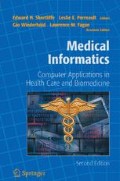Abstract
If you ask people what the phrase “computers in medicine” means, they often describe a computer program that helps physicians to make diagnoses. Although computers play numerous important medical roles, from the earliest days of computing people have recognized that computers might support physicians by helping these people to sift through the vast collection of possible diseases and symptoms. This idea has been echoed in futuristic works of science fiction. In Star Trek, for example, medical workers routinely point devices at injured crew members to determine instantly what is the problem and how serious is the damage. The prevalence of such expectations, coupled with a general societal concern about the influence of computers on interpersonal relationships and on job security, has naturally raised questions among health workers. Just what can computers do today to support clinical decision-making? How soon will diagnostic tools be generally available? How good will they be? What will their effects be on the practice of medicine, on medical education, and on relationships among colleagues or between physicians and patients?
Access this chapter
Tax calculation will be finalised at checkout
Purchases are for personal use only
Preview
Unable to display preview. Download preview PDF.
Suggested Readings
Berg M. (1997). Rationalizing Medical Work: Decision Support Techniques and Medical Practices. Cambridge, MA: MIT Press.
David J.M., Krivine J.P., Simmons R. (Eds.). (1993). Second Generation Expert Systems. Berlin: Springer-Verlag.
Ledley R., Lusted, L. (1959). Reasoning foundations of medical diagnosis. Science, 130:9–21.
Musen M. (1997). Modeling for decision support. In van Bemmel J., Musen M. (Eds.), Handbook of Medical Informatics (pp. 431–448). Heidelberg: Springer-Verlag.
Schwartz W. (1970). Medicine and the computer: the promise and problems of change. New England Journal of Medicine, 283(23): 1257–1264.
Shortliffe E.H. (1989). Testing reality: the introduction of decision-support technologies for physicians. Methods of Information in Medicine, 28:1–5.
Editor information
Editors and Affiliations
Rights and permissions
Copyright information
© 2001 Springer Science+Business Media New York
About this chapter
Cite this chapter
Musen, M.A., Shahar, Y., Shortliffe, E.H. (2001). Clinical Decision-Support Systems. In: Shortliffe, E.H., Perreault, L.E. (eds) Medical Informatics. Health Informatics. Springer, New York, NY. https://doi.org/10.1007/978-0-387-21721-5_16
Download citation
DOI: https://doi.org/10.1007/978-0-387-21721-5_16
Publisher Name: Springer, New York, NY
Print ISBN: 978-1-4899-0517-8
Online ISBN: 978-0-387-21721-5
eBook Packages: Springer Book Archive

